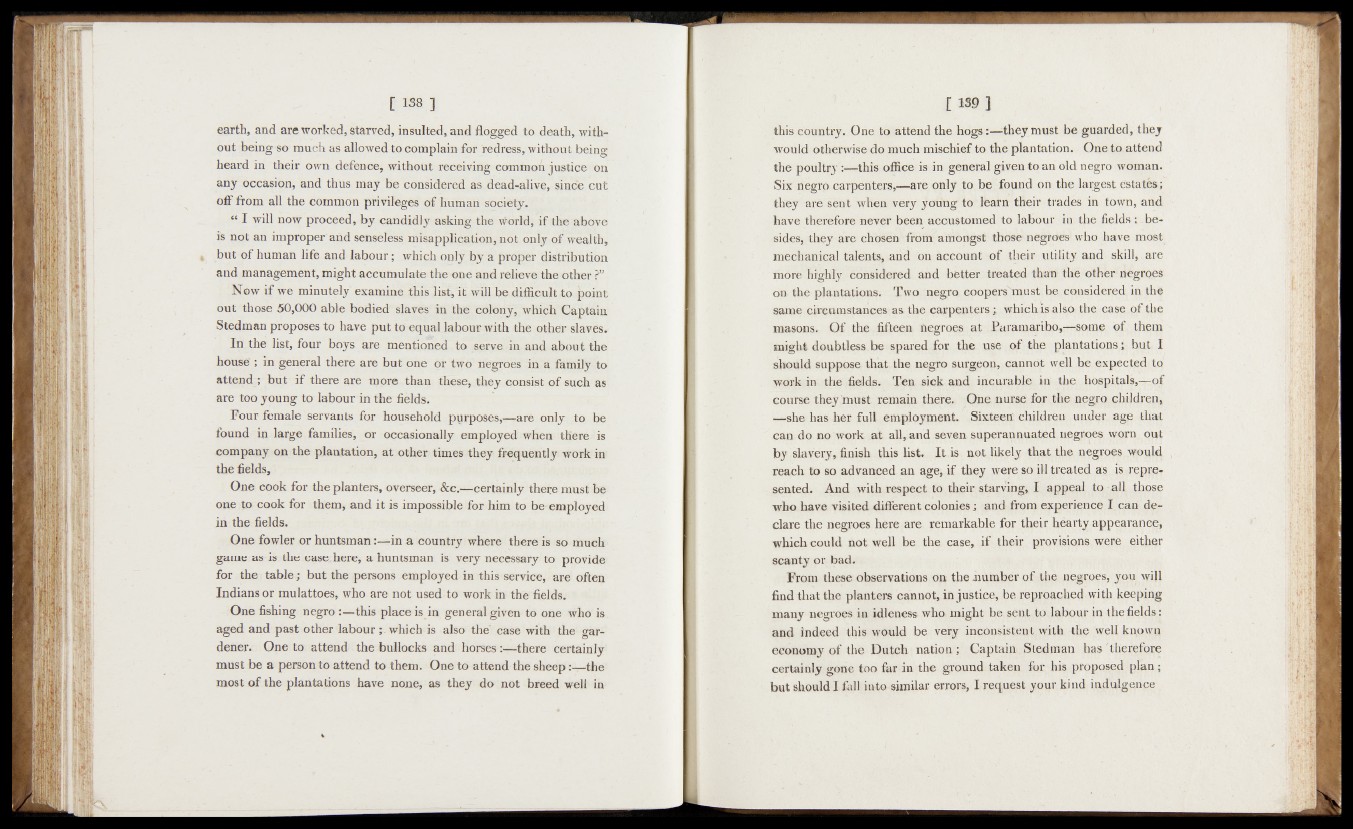
earth, and are worked, starved, insulted, and flogged to death, without
being so much as allowed to complain for redress, without being
heard in their own defence, without receiving common justice ph
any occasion, and thus may be considered as dead-alive, shade cut
off from all the common privileges' o f human society.
“ I will now proceed, by candidly asking the world, if the above
is not an improper'and senseless misapplication, not only of wealth,
but of human life and labour; which only by a proper distribution
and management, might accumulate the one and relieve the other
Now if we minutely examine this list, it will be difficult In .point
out those 50,000 able bodied slaves in the colony, which Captain
Stedman proposes to have put to equal labour with the other slaves^
In the list, four boys are mentioned to ^serve-in and about the
house'; in general there are but one or two rtëgröes in a family to
attend ; but if there are more than these, they consist of such as
are too young to labour in the fields.
Four female servants for household purposes,—rare only to be
found in large families, or occasional ly employed when th'ere is
company on the plantation, at other times they frequently work in
the fields,
One cook for the planters, overseer, &c.—certainly thefe must be
one fit cook for them, and it is impossible for him to be employed
in the fields.
One fowler or h u n tsm a n in a country where there is so much
game as is the case, here, a huntsman is very necessary to provide
for the table; but the persons employed in this service, are often
Indians or mulattoes, who are not used to work in the fields.
One fishing n e g r o th i s place is in general given to one who is
aged and past other labour which is also the’ case with the gardener
One to attend the bullocks and horses :—there certainly
must be a person to attend to them. One to attend the sheep :-r-the
most of the plantations have none, as they do not breed well in
this country. One to-attend the hogs:—they must be guarded, they
would otherwise do much mischief to the plantation. One to. attend
the poultry :—this office istin general given to am Old, negro woman.
Six negrp carpenters,—are only to. be found on,the largest estates;
they* a b sent when-very yotrng to learn their trades in town, and
have therefore never been accustomed to labour in the fields ; be-
asides^they are chosen from ansongst those1 negtoes* who have most
mechanical talents, and on account sapf their utility and skill,,are
more highly considered and better treated than- the other negrpes
on the plantations. Two negro coopers''muskbe. considered, in the
same circumstances as the. carpenters ; whichisalso the^casp^Qf the
masons. Of the fifteen fiegroes ,at Paramaribo»—some of them
might doubtless.be spared for the use of -fcj$p plantations; but I
should; suppose that the negro surgeon, canncg well be expected to
work in the fields. Ten sick and incurable in the. hospitals,-r-qf
course they,'must remain there. One nurse for the negrh ehddf'eih
-—she has her full employment. Sixteen, children under age that
can do no work at all,and seven, superannuated.negroes worn, out
by slavery, finish this list. I t is not likely that the negroes would
reach to so advanced an age* if they were so ill treated as is Jepre^
sented. And with respect to their starving, I appeal to all those
who have visited different colonies; and from experience I. can declare
the negroes here are remarkable for their hearty appearance,
which could not well be the case, if their provisions, were either
scanty or bad.
From these observations on the number of the negroes, you will
find that the planters cannot, in justice, he reproached wi th keeping
many negroes in idleness who might beseut ip Jabour in the fields:
and indeed this would be very inconsistent with the Veil kn,pwn
economy of the Dutch nation; Captain Stedman has 'therefore
certainly gone too far in the ground taken for his proposed plan;
but should I fall into similar errors, I request your kind indulgence